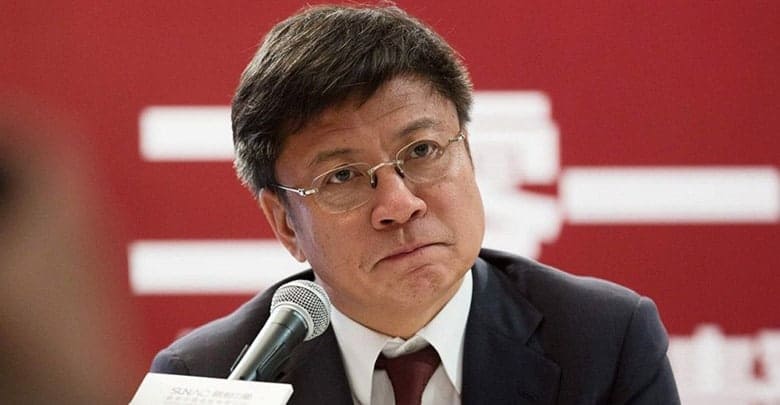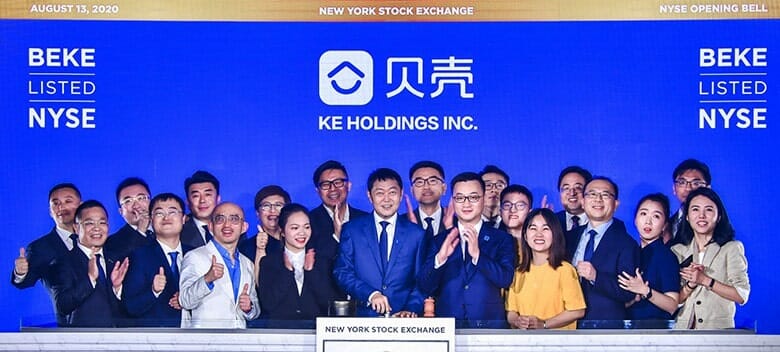
Sunac boss Sun Hongbin is selling assets to raise cash
For the second time in two months, mainland developer Sunac China Holdings has disclosed a sizeable disposal of shares held in housing broker Beike, bringing the total sell-off to $1.084 billion since June.
Hong Kong-listed Sunac revealed Wednesday that it had unloaded a further $530 million worth of Beike’s American depositary shares, which trade on the New York Stock Exchange under the company name KE Holdings, during the period from 29 October to 7 December.
While Sunac expects a loss before taxation of RMB 5.63 billion ($890 million) from the disposals in 2021, the group realised an aggregate pre-tax profit of RMB1.76 billion for the period from the group’s investment in Beike during 2017 to the completion of the disposals, the developer said in a filing with the Hong Kong stock exchange.
Sunac, which has RMB 3.5 billion in domestic bonds becoming puttable in January and another RMB 4 billion becoming puttable in April of next year, has joined a rush of Chinese developers raising capital in recent months, including selling a combined $953 million in new shares in its primary development business and its Sunac Services property management unit in mid-November.
Platforms in Peril
Sunac’s sell-off comes at a perilous time for Beike, whose NYSE-listed shares have tumbled about 65 percent in the year to date after going public in a $2.1 billion IPO in August of 2020, with the company’s market value having risen to nearly $40 billion that month.

Beike’s August 2020 IPO raised $2.1 billion
The Beijing-based property platform offers listings of new and second-hand homes for sale or rent in cities across China. Beike reeled in internet giant Tencent and Japan’s SoftBank as backers but got caught up in a government crackdown on tech-enabled marketplaces this year.
In May, less than a week after founder and chairman Zuo Hui died unexpectedly, regulators opened an investigation into suspected anti-competitive practices by Beike, alleging consumer exploitation, Reuters reported.
In September, Reuters said Beike was planning a Hong Kong listing and had gone so far as to hire Goldman Sachs to lead a float, but the company denied having an “imminent plan” for an HKEX listing or any share sale.
Another name snared in the tech dragnet, ride-sharing service Didi, just announced plans to de-list from the NYSE and re-list on the Hong Kong exchange after its shares fell nearly 50 percent since the start of trading in June.
Four-Year Journey
After climbing to more than $76 per share during the first quarter, Beike’s stock now trades just above its IPO price of $20 at $22.15 per share, with its market cap reduced to around $26.4 billion. Despite having lost out on the opportunity to sell its stock in the the online brokerage its peak in February, Sunac said in the filing that it had achieved “good investment returns”.
The developer had joined China Vanke and other mainland real estate giants in investing in Lianjia in January 2017, taking a nearly 6.3 percent stake in the Beijing brokerage chain before Beike was spun off from the company in 2018.
Sunac, which last month saw Fitch Ratings downgrade its credit from Positive to Stable due to declining contract sales and collections since August of this year, says it plans to use the net proceeds from the disposals as general working capital.
Fund Raising
Distressed-asset specialist Sunac may not face the same level of crisis as contemporaries like China Evergrande, but the Tianjin-based developer has taken steps to shore up its finances as its stock has slid nearly 42 percent so far this year to close at HK$15.72 per share on Thursday.
In announcing the take from its share sale last month, Sunac also said that founder Sun Hongbin had provided the company with a $450 million interest-free loan.
During September, a letter suggesting that the group had sought policy support from the city government of Shaoxing in eastern China’s Zhejiang province set off alarm bells, but the firm quickly downplayed the document’s significance and said business was normal.
Leave a Reply